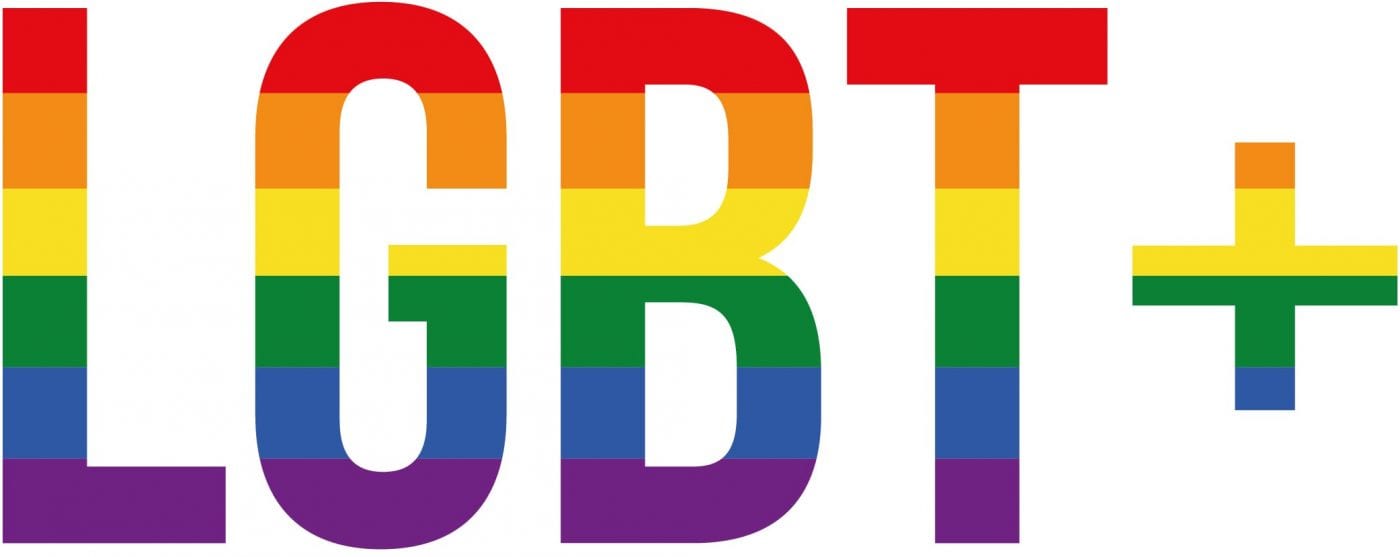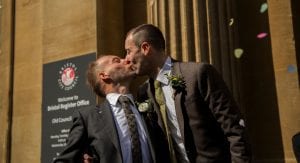By Dr Mike McBeth
Senior Teaching Fellow and Criminology Programme Director
and acting Director of Undergraduate Studies
School for Policy Studies, University of Bristol
I was a boy growing up attracted to other boys in NE England in the 1970s – a dreadful ordeal of bullying, introversion and fear. I always expected to get married though – to a woman of course. I thought that my feelings of attraction about other boys were feelings that all boys had. But I knew that they should be ignored. It seemed inevitable that I’d marry a nice girl and become a father. I also wondered if there was actually something deeply wrong with me – that my feelings were feelings that no-one else had – therefore marrying a girl might be a good way of hiding my true self. I believed and accepted that my life would largely be an unhappy one, with some rare moments of pleasure (and inevitable guilt). Throughout my teenage years, I’d no idea that it was possible to be a man and have physical and emotional attachments with other men and any suggestion that I would one day marry another man would have seemed ridiculous to me.
In the Britain I was born into, homosexual relations between men were illegal. I was six years old when the Sexual Offences Act partially decriminalised consenting sex between two men in ‘private’, but persecution and prosecutions of men for consenting sexual activity actually increased. Not that I noticed – the law succeeded in keeping me completely ignorant that there might be other people like me. Ultimately it proved impossible to ignore my sexuality though and I fell out of the closet at 18 – my mam found out, therefore my dad found out, therefore I left home.
By the early 1980s I was a radical young student – a ‘Commie puff rent-a-gob’, as some Federation of Conservative Students described me (fairly accurately, I suppose). By then it was still possible that I might get married – to some loved-up lesbian from overseas. My marriage would be protest against the ‘heteronormative oppressive institution’ of matrimony! But the opportunity for that never arose, so I didn’t have to get divorced in time for the real thing.
My 20s were lived against a background of hysteria of HIV/Aids. I remember the chief constable of Manchester saying that gays and lesbians were swirling around in a cesspit of their own making. Then the prime minister told her party conference that ‘children … need to be taught to respect traditional moral values … [but] are being taught that they have an inalienable right to be gay’. I really wished that had been true. The government’s principal response to the HIV/Aids tragedy was to tell us not to die of ignorance – odd, given that the same government was refusing to provide any kind of proper sexual and drugs-related public health advice. When the shortcomings of the government’s response to HIV/Aids was highlighted, they enacted legislation to outlaw the ‘promotion’ or teaching the ‘acceptibilty’ of homosexuality as a ‘pretended family relationship’. This was Section 28 – the first legislative assault on gay men since 1885 when the law determined sex between men amounted to ‘gross indecency’ punishable by two years’ imprisonment with hard labour.
I threw myself into activism and my socialism was anchored in campaigns for equality. In 1985 I was at the Labour conference that first committed a future Labour government to equal rights for gays and lesbians. Losing the 1987 and 1992 general elections were terrible blows. But then 1997 really did feel like ‘a new dawn’ – at least for us. Progress was rapid: in 2000 the ban on LGBT people serving in the military was lifted. In 2001 the age of consent in England, Scotland and Wales was equalised (still not in N Ireland). From 2002 same sex couples could legally adopt. In 2003 the offence of gross indecency was removed and Section 28 was repealed. In 2005 same sex couples could enter civil partnerships.
I met my future husband in 1994. By 2005 when civil partnerships were possible we were more-or-less regarded as ‘married’ by everyone who knew us. Matthew asked me if I would become his civil partner. I refused. Undeterred, a little while later he asked me again. I said no again! It wasn’t that I didn’t love him or couldn’t see us committing to each other. I felt that civil partnerships were not equality – heterosexuals couldn’t be civil partners and we couldn’t marry. I knew that I was never going to be anyone’s civil partner. I also knew that after declining civil partnership proposals twice, if same sex marriage was ever introduced, I was going to have to be the one to ask!
Same-sex marriage was made possible in July 2013 and I’d lived with Matthew for 19 years by then. My attitude to getting married was that it was important to make a political point about gay men having have long-term, loving relationships. Although I didn’t ever expect to be a blushing groom, it was quite romantic. I proposed to Matthew on the Eiffel Tower. I know what you’re thinking – but he said yes! Once the law changed it was another eight months before the government announced that the first same-sex marriages could take place on Saturday 29 March 2014. We didn’t set out to be first, but it was important to me that we were married on the first possible day. We booked the Bristol register office at 11:00 to give our friends and family enough time to get there but no-one else choose an earlier time, so we were the first same-sex couple to marry in Bristol.
The biggest threat to our wedding turned out to be the city council. It hadn’t occurred to me that our dog wouldn’t be allowed – and he’d been tasked to play an important best-dog role of ring carrier. The staff in the register office assured us that they were all dog-lovers, but that council rules forbade dogs. I was distraught – Zoly had to be there. The registrar hinted a change of policy would be welcome, so we immediately wrote to the mayor to ask if he’d like to come and if it would be ok to have our dog there too. The mayor declined our invitation, but said that he saw no reason not to allow dogs in wedding ceremonies at the register office! So the wedding was back on. Not only were we the first men to marry each other in Bristol, but we were the first to have a non-assistance dog there too!
Matthew took himself off to the Bristol Grand Hotel for the night before our wedding, which I thought was rather extravagant, but since I’d been the one who’d gone all traditional and insisted that we slept apart that night, I could hardly complain. On the day, I went to have my haircut and as I left the salon, a woman was just arriving – she was getting married later that day too! To her girlfriend!! It was fantastic – we congratulated each other and just about everyone in the salon was in tears! I went for my daily run and when I arrived back home I noticed that most of the local children were taking turns to be ridden around the street on a bicycle rickshaw. I knew that this was odd – but I live in Southville, so we learn not to react to odd things in the street. It didn’t cross my mind that Matthew had booked the rickshaw to take us to the register office!
I loved getting married. One of our American friends read Armistead Maupin’s ‘Letter to momma’ in our ceremony – and said “momma” like no British person ever could! Zoly chewed the box with our rings in it – and it still has little indentations. In the exchange of vows I’m pretty sure Matthew said “From this gay forward” instead of “From this day forward” – but he denies it. Afterwards, we stood on the register office steps and our friends held up a ‘Just Married’ rainbow banner – that’s now in the M-Shed museum of Bristol, which I suppose makes me something of a museum piece. Friends from my running club timed a run-past all in club colours. Complete strangers came up to us and shook our hands and offered congratulations – including an ordained Church of England vicar who said they’d have broken church rules to marry us. Stall holders in Corn Street started giving us presents – what do you do with a huge bag of Pie Minister pies when you’re heading off to a wedding reception?! All the vegan food at the reception was amazing and even the less progressive members of our families said it was delicious and wondered if it was the sort of food that we ate all time! We also made it on to the front page of the next issue of the Bristol Post.
I’ve been married for over four years now and in June I’ll have been with Matthew for 25 years. Despite my pronouncement that same-sex marriage was a political statement, I love being married. It’s wonderful to be able to refer to my husband – previously: boyfriend or partner or life-partner – as my husband. I still enjoy it when some people take a moment to process that. But I think that it’s a sign of how far things have changed that people doing a double-take when they find out that I’m married to another man happens less and less often. LGBT progress in my lifetime has been astonishing to me – I’m immensely proud of what’s been achieved and of the people that helped make it happen.


